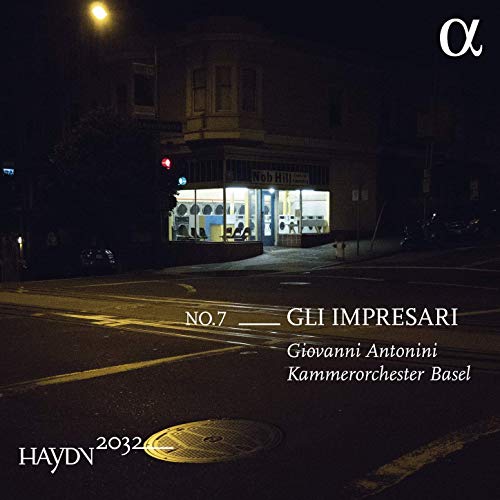Kammerorchester Basel, Giovanni Antonini
73:01
Alpha Classics Alpha 680
Symphonies 9, 65 & 67; Mozart: Thamos, König in Egypten
A search in the EMR archives will reveal several of my previous reviews of this thrilling vibrant cycle of Haydn’s symphonies, due for completion in time for the 300th anniversary of the composer’s birth in 2032. Among its many merits is the evidence of the care and thought that has gone into the planning of the series, with each CD not only given its own theme but also including either a non-symphonic work by Haydn or relevant music by a contemporary.
Vol 7 carries the appendage ‘The theatre managers’ and includes symphonies written for or adapted from music believed to have been intended for dramatic works staged at Eszterháza. If that sounds convoluted then blame the notes of musicologist Christian Moritz-Bauer (M-B), which are by no means always clear as to the reasoning behind his claims of theatrical connections between the three symphonies featured here. The most convincing argument is for No. 65 in A, the quirky nature of which, with its military and hunting calls, led Robbins Landon to suspect connections with the stage more than 40 years ago. M-B has now pretty convincingly tied it to Der Postzug, a comedy by Cornelius von Ayrenhoff (1769) that became highly fashionable and is known to have been given at Eszterháza. The evidence for No. 9 in C (c. 1762) – ‘probably a prelude to a secular cantata’ (M-B) – and No. 67 in F (1779) is less compelling, though again Robbins Landon had his suspicions about the latter, a work that became one of the most popular of the middle-period symphonies and which he described as ‘boldly original’. The first movement, which juxtaposes extreme delicacy with thrillingly propulsive Sturm und Drang writing is succeeding by an Adagio that fuses chamber music luminosity with contrapuntal complexity. There is, of course, no argument about the final pieces on the CD, the orchestral pieces from the incidental music Mozart wrote for Tobias von Gabler’s play Thamos, König in Egypten. First given in Vienna 1773, Mozart’s music for it postdates that and in its present form probably dates from a Salzburg performance of the play in 1779.
The performances unsurprisingly bear the same hallmarks as those that distinguished previous issues in the series, though I sensed the extremes of dynamics were less marked formerly. This may possibly be explained by the orchestra, one of the two Antonini has to date employed for the series, since the Kammerorchester Basel tends to less febrile playing than his own Il Giardino Armonico. That’s not to say there’s anything tame about the superlative Swiss orchestra, whose playing fully equals that of their Italian colleagues. Indeed one of the major hallmarks of the series has been the intensity and dramatic impetus contrasted with delicacy and light, chamber-music transparency. One need listen no further than the opening few minutes of No. 67, with its ethereally weighted and pointed introduction answered by a full orchestral outburst, with low horns a-snarling to thrilling effect. One other point that I’ve possibly not previously stressed sufficiently is Antonini’s wonderful ear for acutely judged orchestral balance, an asset he shares with his compatriot and friend Ottavio Dantone. Listen, for example, to the Maestoso-Allegro (No.1) of the Thamos music, where despite the full orchestration including trombones and cracking timpani the majesty of Mozart’s intense dark-hued writing stands fully revealed.
This is another valuable addition an already highly distinguished intégrale, essential listening for all Haydn enthusiasts.
Brian Robins
Click here to visit the record company’s website.
